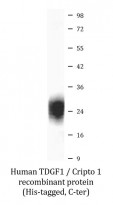ARG70273
Human TDGF1 / Cripto 1 recombinant protein (His-tagged, C-ter)
Human TDGF1 / Cripto 1 recombinant protein (His-tagged, C-ter) for Binding Activity,SDS-PAGE and Human
Overview
| Product Description | HEK293 expressed, His-tagged (C-ter) Human TDGF1 / Cripto 1 recombinant protein. |
|---|---|
| Tested Reactivity | Hu |
| Tested Application | Binding, SDS-PAGE |
| Target Name | TDGF1 / Cripto 1 |
| Species | Human |
| A.A. Sequence | Leu31 - Thr172 of Human TDGF1 / Cripto 1 (NP_003203) with 6X His tag at the C - terminus. |
| Expression System | HEK293 |
| Alternate Names | CRGF; Teratocarcinoma-derived growth factor 1; Cripto-1 growth factor; CR; CRIPTO; Epidermal growth factor-like cripto protein CR1 |
Application Instructions
| Application Note | Binding activity test: Measured by its binding ability in a functional ELISA. Immobilized Recombinant Human Cripto at 2 µg/ml (100µl/well) can bind Recombinant Human ALK4 with a linear range of 0.15-151 ng/ml. |
|---|
Properties
| Form | Powder |
|---|---|
| Purification Note | 0.22 µm filter sterilized. Endotoxin level is <0.1 EU/µg of the protein, as determined by the LAL test. |
| Purity | > 95% (by SDS-PAGE) |
| Buffer | PBS (pH 7.4) |
| Reconstitution | Reconstitute to a concentration of 0.1 - 0.5 mg/ml in sterile distilled water. |
| Storage Instruction | For long term, lyophilized protein should be stored at -20°C or -80°C. After reconstitution, aliquot and store at -20°C for up to one month, at 2-8°C for up to one week. Storage in frost free freezers is not recommended. Avoid repeated freeze/thaw cycles. Suggest spin the vial prior to opening. |
| Note | For laboratory research only, not for drug, diagnostic or other use. |
Bioinformation
| Gene Symbol | TDGF1 |
|---|---|
| Gene Full Name | teratocarcinoma-derived growth factor 1 |
| Background | This gene encodes an epidermal growth factor-related protein that contains a cripto, FRL-1, and cryptic domain. The encoded protein is an extracellular, membrane-bound signaling protein that plays an essential role in embryonic development and tumor growth. Mutations in this gene are associated with forebrain defects. Pseudogenes of this gene are found on chromosomes 2, 3, 6, 8, 19 and X. Alternate splicing results in multiple transcript variants. [provided by RefSeq, Mar 2010] |
| Function | GPI-anchored cell membrane protein involved in Nodal signaling. Cell-associated TDGF1 acts as a Nodal coreceptor in cis. Shedding of TDGF1 by TMEM8A modulates Nodal signaling by allowing soluble TDGF1 to act as a Nodal coreceptor on other cells (PubMed:27881714). Could play a role in the determination of the epiblastic cells that subsequently give rise to the mesoderm (PubMed:11909953). [UniProt] |
| Cellular Localization | Cell membrane; Lipid-anchor, GPI-anchor. Secreted. Note=Released from the cell membrane by GPI cleavage. [UniProt] |
| Calculated MW | 21 kDa |
Images (1) Click the Picture to Zoom In






